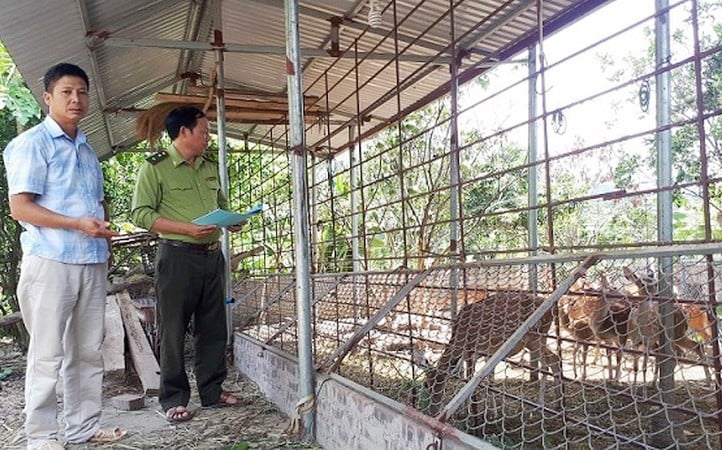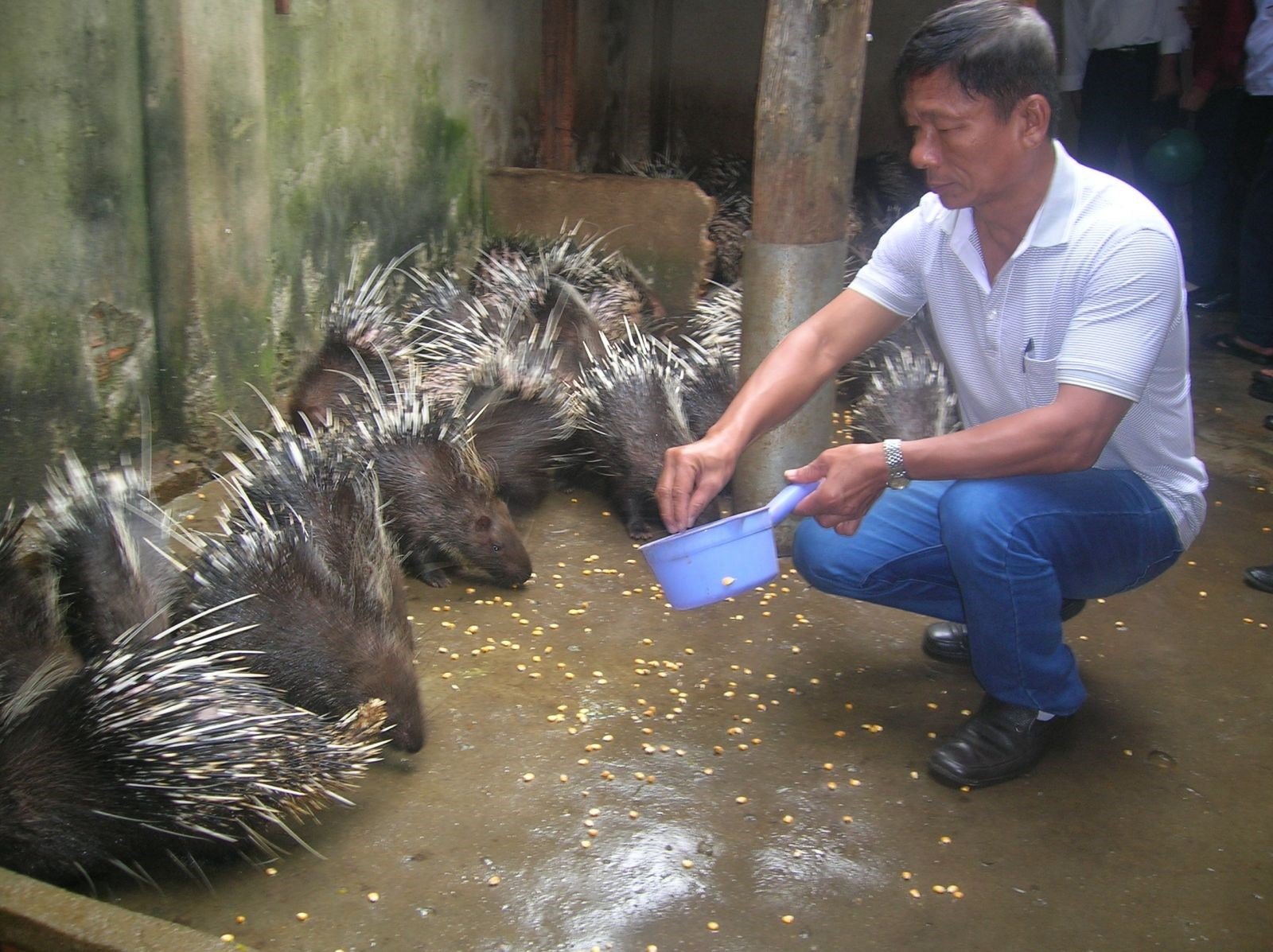June 17, 2025 | 02:15 GMT +7
June 17, 2025 | 02:15 GMT +7
Hotline: 0913.378.918
June 17, 2025 | 02:15 GMT +7
Hotline: 0913.378.918

The functional force inspects and guides the sika deer breeding facility in Luc Ngan district, Bac Giang.
Approximately 75% of infectious diseases in humans are of animal origin. The COVID-19 pandemic is speculated to be among these. To solve the problem comprehensively, CGIAR launched the initiative "Protecting human health through a One Health approach". In which the component on zoonotic diseases was implemented in seven countries, including Vietnam, with a focus on disease control in wildlife captive breeding facilities in Lao Cai and Dong Nai provinces.
The One Health approach focuses on multidisciplinary collaboration, helping to early detect and prevent the risk of disease transmission from animals to humans.
In Vietnam, the activity of wildlife captive breeding is quite common in localities. Vietnam currently has approximately 14,000 wildlife captive breeding farms with roughly 70 species, such as wild boar, bamboo rat, civet, porcupine, turtle, long-tailed gibbon, monkey, and several species of birds.
With more than 12,000 individuals being captive-bred in the area, Lao Cai province is considered an emerging hotspot for wildlife captive breeding in the Northern region. Mr. Pham Ba Uyen, Director of the Lao Cai Animal Husbandry and Veterinary Branch, said: "Hopefully this research will contribute to improving the understanding of zoonotic diseases, helping to protect public health.”
Meanwhile, Dong Nai province, located in the Southeast region, currently has approximately 670 captive breeding facilities and more than 336,000 wildlife individuals. This place is characterized by activities in captive breeding and wildlife trading concentrated near national parks and conservation areas.
The research of an expert team in the two Lao Cai and Dong Nai provinces will focus on assessing the circulation and determining the risks and transmission routes of zoonotic pathogens in species such as bats, bamboo rats, wild boars, and civets.
This information will serve as a foundation for scientists to design intervention measures in the wildlife value chain, strengthen the capacity to control emerging infectious diseases and design appropriate biosafety measures.

Wildlife farming is developing in many localities nationwide.
In addition to identifying hotspots of zoonoses, the research results also serve as a database to launch intervention measures such as training to improve capacity, awareness, attitudes, and procedures related to zoonotic diseases. It is also a way to strengthen the capacity to monitor and respond to infectious disease outbreaks in these value chains.
The component on zoonotic diseases is expected to begin data collection in Lao Cai and Dong Nai at the end of 2023. The research team is currently holding a consultation meeting with relevant parties, purchasing test kits, catalysts, etc., and training officers on information collection.
Dr. Bernard Bett, operation coordinator on emerging infectious diseases and infectious diseases from animals at the International Livestock Research Institute (ILRI) and coordinator of the zoonosis component under the CGIAR’s One Health initiative, said, “Enhancing understanding of the wildlife-borne risks and mechanisms of zoonotic transmission will help governments devise strategies to manage wildlife better, ensuring the development of both humans and livestock".
Dr. Nguyen Viet Hung, Coordinator of CGIAR's One Health initiative, expressed the same view: "The results from the research team's business trips and field surveys in Lao Cai and Dong Nai in early 2023 showed that the biosafety measures in the localities are not guaranteed. People's knowledge about zoonotic diseases is relatively limited."
Another problem, according to Mr. Nguyen Viet Hung, is that local resources to manage the activity of wildlife captive breeding and the risks of disease transmission are still inadequate, especially in farms and wildlife trading markets.
During the implementation process, Vietnam will receive advice and support from an international team of experts from Sweden, Kenya, and the United States to ensure a multi-dimensional approach. Ms. Nguyen Thi Thanh Ha, a PhD student at Uppsala University, Sweden, and ILRI Vietnam, added that the research would include both quantitative and qualitative research, laboratory and field studies as well as research on humans and animals.
The One Health initiative (2022-2024) is one of CGIAR’s 32 initiatives to create sustainable food, land, and water systems with resistance ability. In Vietnam, the initiative is co-implemented by ILRI, the International Food Policy Research Institute, the Institute of Veterinary Medicine, the Hanoi University of Public Health, the Vietnam One Health Partnership for Zoonoses, and related partners.
On July 6, 1885, Louis Pasteur successfully used a vaccine against rabies in humans. Every year, July 6 is considered World Zoonoses Day to help people raise awareness and take the right actions to prevent infectious diseases.
Translated by Huyen Vu Thu

(VAN) The working delegation from the Ministry of Agriculture and Environment conducted an important trip to the Netherlands to strengthen strategic partnerships and sustainable development in the agricultural sector.

(VAN) The letter ‘A Plea from the Ocean’ not only evokes emotion but also awakens the human conscience to the responsibility of protecting life on Earth.

(VAN) The Department of Agriculture in South Africa has announced the country’s first mass vaccination of poultry to prevent local birds from contracting avian influenza.

(VAN) Establishment of the Mekong Delta Regional Agricultural Linkage Center, aiming for a closed value chain, deep processing, trading platforms, and international market connectivity.

(VAN) Gia Lai province has recently recorded 460 rare species of animals and plants, contributing to forest conservation and biodiversity planning in the region.

(VAN) Ms. Caroline Beresford, New Zealand Ambassador to Vietnam, expressed confidence that agricultural cooperation between Vietnam and New Zealand will develop sustainably, be climate-resilient, and promote gender equality.

(VAN) Vietnam reaffirms its commitment to international cooperation in fostering sustainable and responsible fisheries while ensuring resilient livelihoods for small-scale fishing communities.